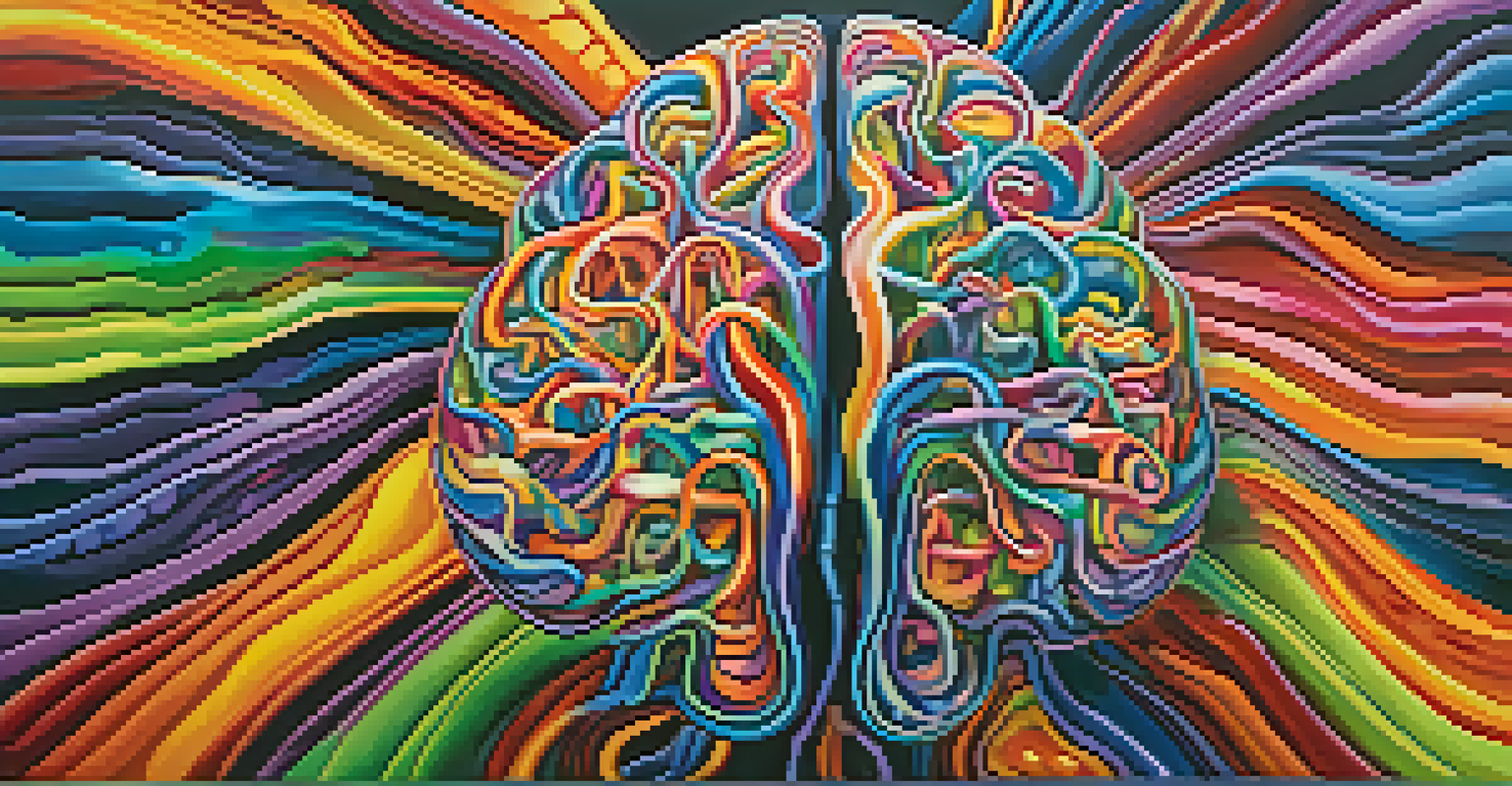Psychedelics and the Quest for Psychological Well-Being

Understanding Psychedelics and Their Effects
Psychedelics are substances that can alter perception, mood, and cognitive processes. Common examples include psilocybin (found in magic mushrooms) and LSD. These compounds interact with brain receptors, particularly serotonin, leading to changes in consciousness and emotional states.
Psychedelics can help us confront our fears and traumas, opening doors to healing that we never knew existed.
Historically, psychedelics have been used in various cultures for spiritual and therapeutic purposes. More recently, scientific research is rekindling interest in their potential for mental health treatment. Studies suggest they may help with conditions like depression and anxiety, making them a focus for modern psychological practices.
Understanding how psychedelics work is crucial for evaluating their therapeutic potential. They can induce profound experiences that lead to new perspectives on personal issues, often referred to as 'ego dissolution.' This shift can help individuals confront and process difficult emotions or traumas.
The Rise of Psychedelic Therapy
In recent years, psychedelic therapy has gained traction as a legitimate mental health treatment. Researchers are exploring how these substances can be integrated into psychotherapy sessions to enhance outcomes. This resurgence is partly fueled by the growing dissatisfaction with traditional treatments for mental health disorders.

Clinical trials have shown promising results, with participants reporting significant reductions in symptoms after guided psychedelic sessions. For example, studies involving psilocybin have demonstrated potential in alleviating depression and anxiety in terminally ill patients. This offers a glimpse into how psychedelics can reshape the therapeutic landscape.
Psychedelics Aid Mental Health
Research shows psychedelics can effectively treat conditions like depression, PTSD, and addiction by facilitating emotional healing and new perspectives.
However, it's essential to approach this field with caution. While the results are encouraging, psychedelics are not a one-size-fits-all solution. Ongoing research aims to better understand who may benefit most and under what conditions, ensuring safety and efficacy in their application.
Psychedelics and Mental Health Conditions
Psychedelics show promise in treating various mental health conditions, including PTSD, depression, and addiction. For those grappling with the aftermath of trauma, psychedelics can facilitate a reprocessing of experiences, allowing for healing and growth. This is particularly relevant for veterans and survivors of abuse.
The therapeutic use of psychedelics has the potential to change the landscape of mental health treatment.
The ability of psychedelics to foster new insights and perspectives can lead to significant breakthroughs in therapy. Patients often report feeling a sense of connectedness, both to themselves and others, which can alleviate feelings of loneliness and despair. This emotional resonance is a powerful tool in the therapeutic arsenal.
Moreover, psychedelics may rewire the brain, promoting neuroplasticity—a vital process for recovery. By encouraging new neural pathways, these substances can help individuals break free from entrenched patterns of thought and behavior, paving the way for lasting change.
The Role of Set and Setting
A key concept in psychedelic therapy is the importance of 'set and setting.' 'Set' refers to the individual's mindset going into the experience, while 'setting' involves the physical and social environment. Both factors can significantly influence the outcomes of a psychedelic experience.
Creating a supportive and safe environment can enhance the therapeutic effects of psychedelics. This is why guided sessions with trained professionals are recommended. They ensure that participants feel secure and understood, allowing for deeper exploration of their mental landscapes.
Importance of Set and Setting
The success of psychedelic therapy greatly depends on the individual's mindset and the environment in which the experience occurs.
Conversely, an unfavorable set or setting can lead to challenging experiences, sometimes referred to as 'bad trips.' These can be distressing and counterproductive, highlighting the need for careful preparation and support throughout the process.
Integrating Psychedelic Experiences into Daily Life
One of the most intriguing aspects of psychedelic therapy is how individuals integrate their experiences into everyday life. Many report lasting changes in perspective and behavior following a session, often describing a newfound appreciation for life. This integration process is crucial for maximizing therapeutic benefits.
Therapists often work with clients post-experience to help them make sense of insights gained during their journey. This can involve discussing emotions, relationships, or life goals that emerged during the session. By processing these experiences, individuals can translate their insights into actionable changes.
Journaling, meditation, and community support are common practices that aid in this integration. Engaging in these activities can help solidify the lessons learned and encourage ongoing personal growth, making the psychedelic experience a catalyst for long-term psychological well-being.
Legal and Ethical Considerations
As interest in psychedelics grows, so do the discussions surrounding their legal and ethical implications. In many places, these substances remain classified as illegal, which can hinder research and access to potential therapies. Advocates argue for re-evaluating these laws to reflect the emerging evidence of their benefits.
Ethically, the use of psychedelics in therapy raises questions about consent, safety, and accessibility. Ensuring that individuals are fully informed and prepared for their experiences is paramount. This includes understanding potential risks and the psychological impact of their use.
Future of Psychedelic Therapy
With growing acceptance and ongoing research, psychedelics may soon be integrated into mainstream mental health treatments, offering new avenues for healing.
As the field evolves, it's vital to establish guidelines that protect participants while promoting responsible research and treatment practices. Balancing innovation with ethical considerations will be essential for the future of psychedelic therapy.
The Future of Psychedelics in Mental Health
The future of psychedelics in mental health treatment looks promising, with ongoing research and increasing acceptance within the medical community. As more studies validate their efficacy, we may see broader clinical applications and the development of new therapeutic protocols. This could significantly expand treatment options for those suffering from mental health conditions.
Moreover, as public perception shifts, there may be more opportunities for individuals to access these therapies legally and safely. This could lead to the establishment of dedicated clinics and trained professionals specializing in psychedelic therapy, making it more widely available.

Ultimately, the quest for psychological well-being through psychedelics represents a profound shift in how we understand mental health. By embracing this potential, we may unlock new pathways to healing that resonate deeply with individuals seeking relief from their struggles.